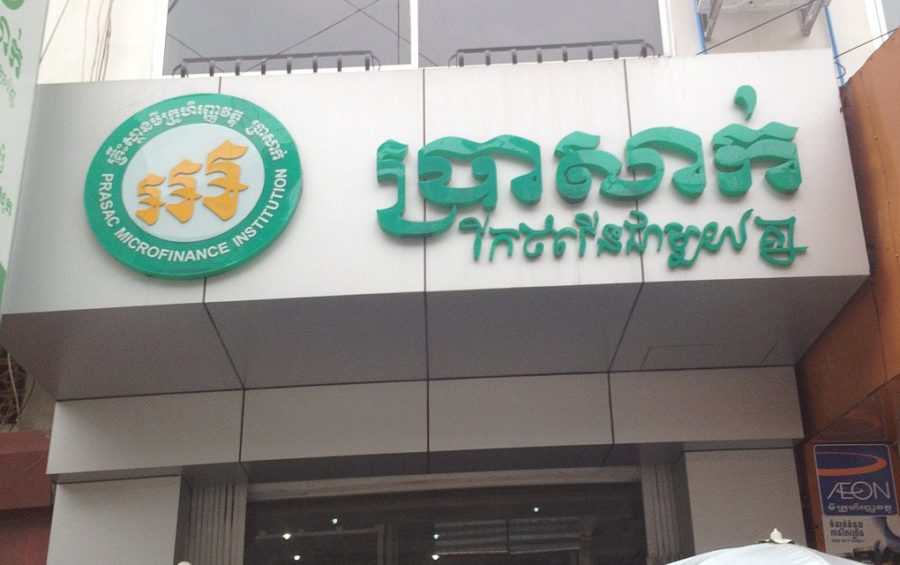Microlender Prasac has been considered as being in default of more than $800 million in liabilities to funders due to the quality of its assets, according to its interim financial report, as credit risks rise across the microfinance sector amid a Covid-19-driven economic slump.
The financial report, submitted to the Cambodia Securities Exchange, shows the company’s profits falling slightly from $47 million to $37 million for the first half of the year compared to the same period a year earlier.
However, it also discloses major difficulties with the microlender’s own borrowings — the source of the money that is typically then lent on to Cambodian households.
As of June 30, Prasac is in breach of terms on debts amounting to $389 million “with respect to asset quality,” it says.
This “constituted an event of default,” and liabilities totaling $878 million “became immediately due and payable,” the document says.
Of the $878 million due, $13.5 million have been paid off, while lenders granted waivers for $56 million as of August 14, it says.
“The Company is working on securing the waiver for the remaining liabilities,” it says.
According to the financial report, Prasac borrowers owed the company a total of $2.7 billion as of June 30.
Prasac chief executive Sim Senacheert, senior vice president Say Sony and marketing manager Pen Sovannsoksitha did not respond to questions.
Mekong Strategic Partners founder Stephen Higgins said the situation was likely a “technical default” since Prasac’s nonperforming loan rate “didn’t seem that bad” given the economic environment.
“That said, being in default on nearly $900m of loans is not a good look, and surely was worth some explanation in their CSX announcement,” Higgins said in an email. “Ultimately they’re owned by a very strong bank in Kookmin, so I don’t think they’re at risk.”
KB Kookmin Bank, a South Korean commercial bank, bought 70 percent of Prasac in April.
Higgins added that he knew of no other Cambodian microlenders in the same situation as Prasac.
Cambodian Microfinance Association spokesperson Kaing Tongngy referred questions to Prasac.
He noted only that the association monitors the credit market in order to help the industry “mitigate the economic impact of the Covid-19 pandemic,” and that the financial sector’s nonperforming loan rate rose only from 1.3 to 2.3 percent between January and August.
“[T]he number is considered sustainable by global standards in the industry,” Tongngy said.
The value of nonperforming loans roughly doubled from a low base, amounting to under 1 percent of total loans, in the six months to June for CSX-listed microlenders Hattha Kaksekar, LOLC and Prasac, according to their financial reports.
Underperforming loans — or “stage 2” loans whose risks increased significantly — rose faster.
| Dec. 31 | June 30 | Value Increase | % of Total Loans | |
| HKL | $1,342,114 | $24,829,102 | ×18.5 | 2.3% |
| LOLC | $894,912 | $205,889,274 | ×230.1 | 25.7% |
| Prasac | $1,378,746 | $81,876,302 | ×59.4 | 3.1% |
According to the Credit Bureau, late repayments of consumer credit — by more than 30 days — rose 65 percent in the second quarter compared to the first three months of the year.
There was significant regional variation, however, with the plains area around Phnom Penh seeing only a 38 percent increase but the coastal, northeastern plateau and Tonle Sap areas rising between 162 to 249 percent.
The total late payment rate remained between 2.4 and 3.6 percent.
Neither the Credit Bureau nor National Bank responded to questions.
The country has been hit by widespread job losses and loss of incomes amid the Covid-19 pandemic, which has caused orders to the garment export industry to plummet and tourism to crater.
The World Bank on Tuesday forecast a 2 percent contraction for the country’s economy this year, following an Asian Development Bank report earlier this month projecting a 4 percent downturn.













